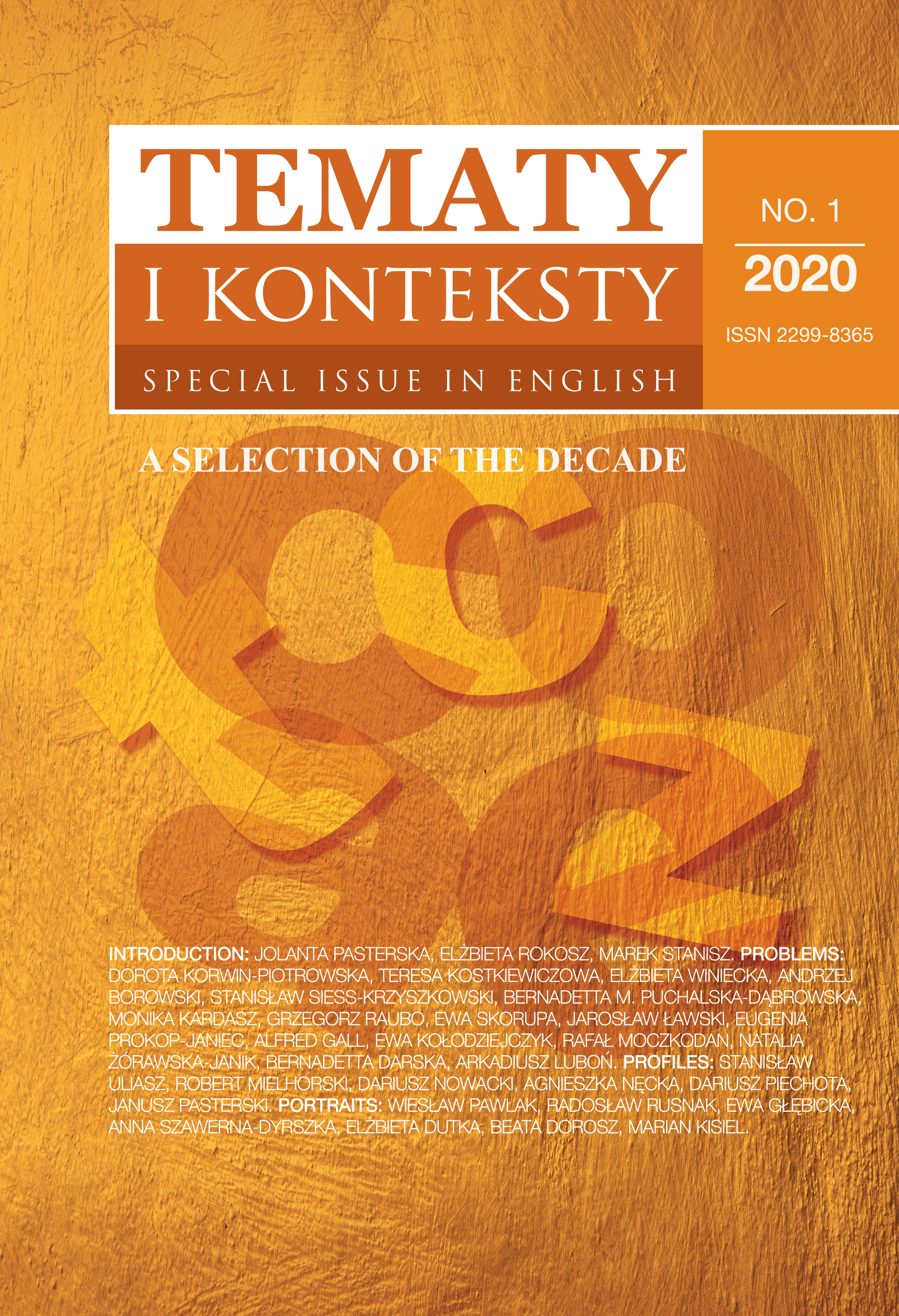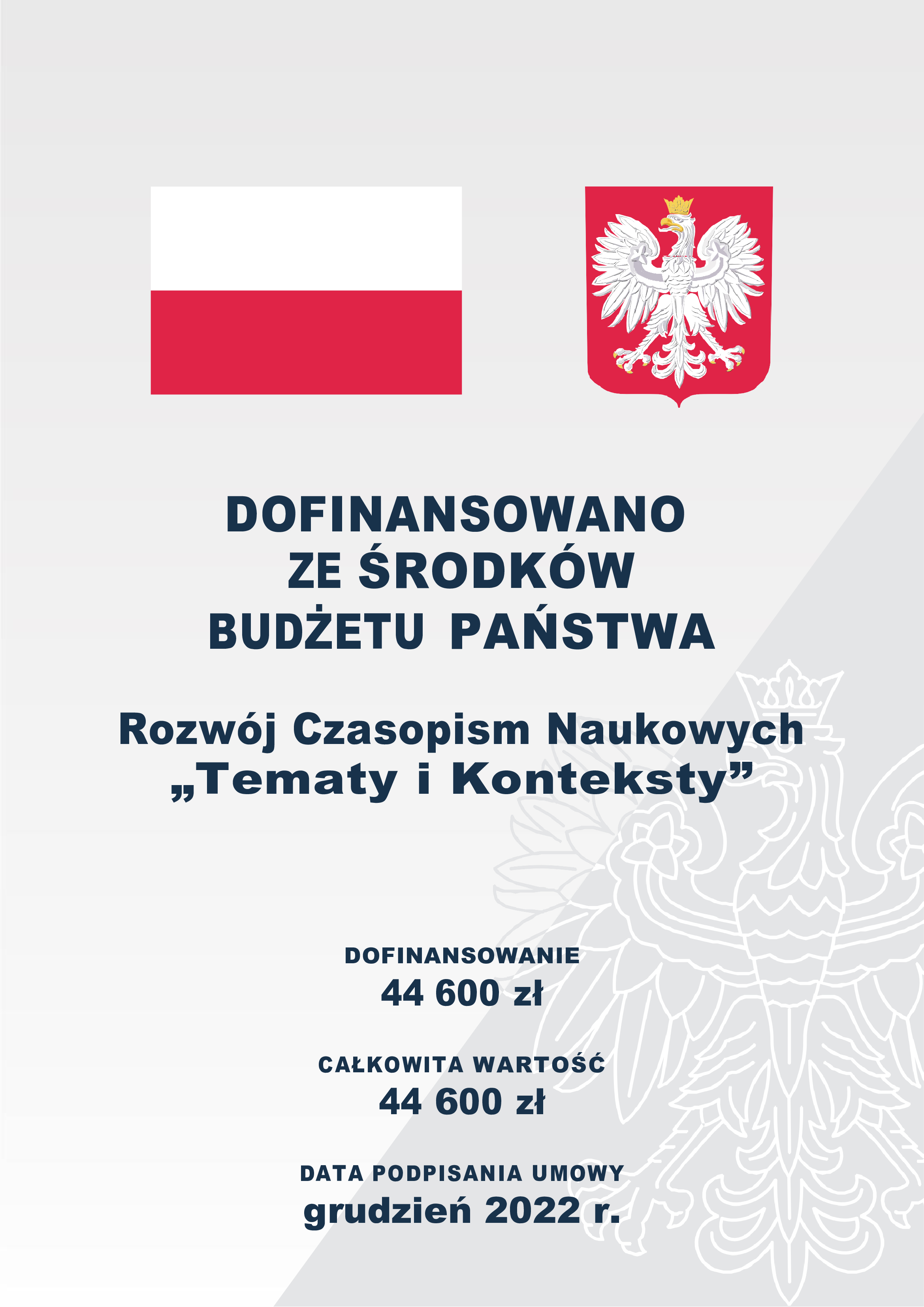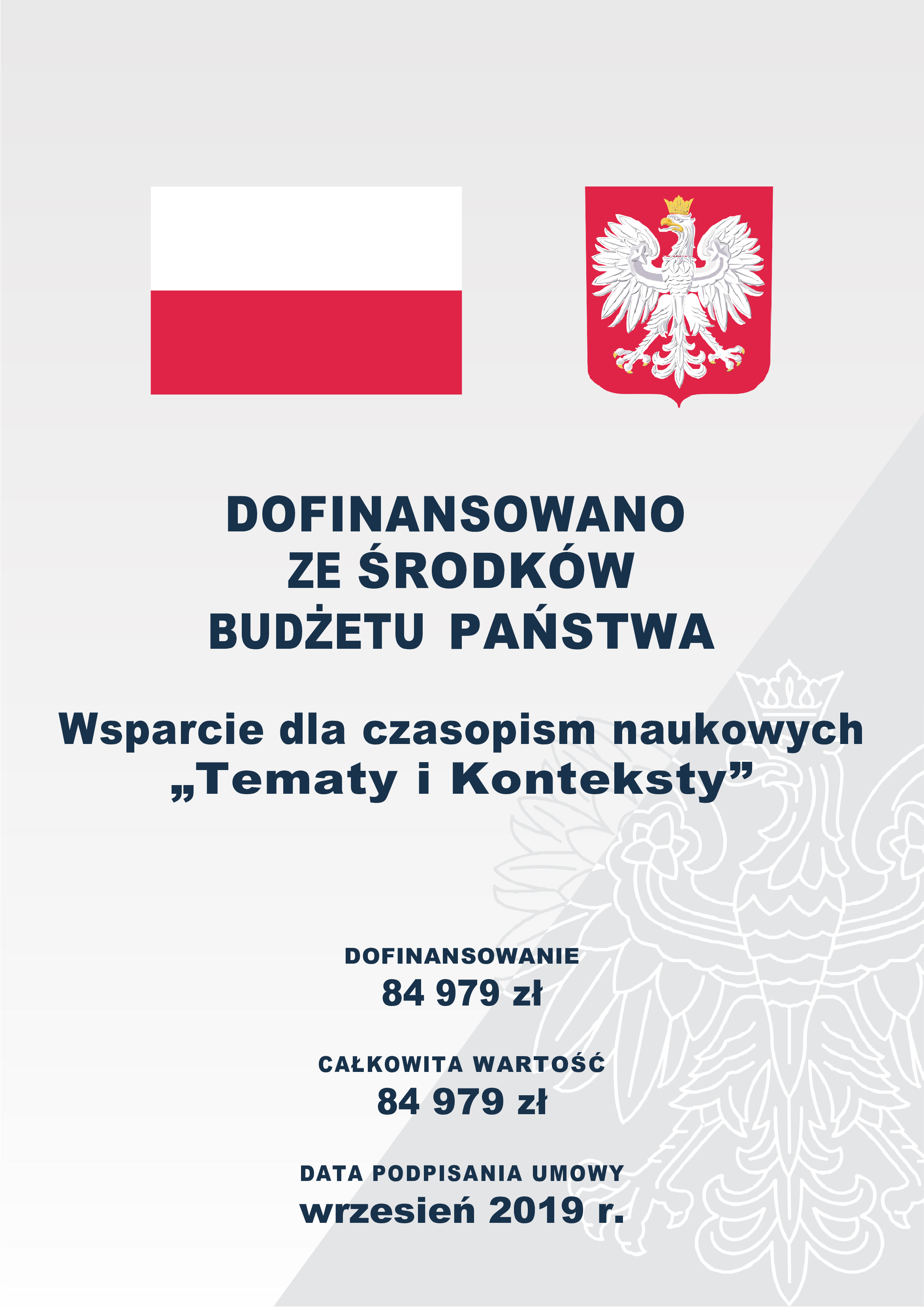The Writings of Jakub Susza (Jacob SuThe Writings of Jakub Susza (Jacob Susha). A Page from the History of Uniate Literature in the Polish-Lithuanisha). A Page from the History of Uniate Literature in the Polish-Lithuanian Commonwealth in the 17th Century
DOI:
https://doi.org/10.15584/tik.spec.eng.2020.24Keywords:
Union of Brest, Jakub Susza/Susha, Polish literature of the 17th centuryAbstract
The article presents the writings of Jakub Susza (Jacob Susha, c. 1610– 1687), the Uniate bishop of Chełm 1652–1687. His most important works: the Latin
biographies of Josaphat Kuntsevych (Cursus vitae et certamen martyrii b. Iosaphat Kuncevicii..., Rome 1665) and Meletius Smotrytsky (Saulus et Paulus Ruthenae Unionis sanguine beati Iosaphat transformatus sive Meletius Smotriscius..., Rome 1666) and the history of the revered icon of Our Lady of Chełm (Phoenix redivivus albo obraz starożytny chełmski Panny i Matki Przenajświętszej, Zamość 1646, Lvov 1653, Zamość 1694), all represent little-known literature written within the Uniate Church. Jakub Susza’s intellectual development, his education in Jesuit colleges in Braniewo, Pultusk and Olomouc, and the characteristic features of his works (the consistent use of Polish and Latin as literary languages, the use of western Latin and Polish literary models) contribute to his image as an example of latinisation and occidentalisation (which at that time meant polonisation) of higher Uniate clergy in the Commonwealth, though as a bishop he took care to preserve the religious identity of the Eastern church.
Downloads
References
Баран O., “Холмський эпископ Якiв Суша – дослiдник минувшини Холмскої землi,” in: Kościoły wschodnie w Rzeczypospolitej XVI–XVII wieku. Zbiór studiów, edited by A. Gil, Lublin: Instytut Europy Środkowo-Wschodniej, 2005
Bendza M., Tendencje unijne względem cerkwi prawosławnej w Rzeczpospolitej w latach 1674–1686, Warszawa: Chrześcijańska Akademia Teologiczna, 1987.
Bieńkowski L., “Kultura intelektualna w kręgu Kościoła Wschodniego w XVII i XVIII w.,” in: Dzieje Lubelszczyzny, Vol. 6: Między Wschodem i Zachodem, Part 1: Kultura umysłowa, edited by J. Kłoczowski, Warszawa: Państwowe Wydawnictwo Naukowe, 1989.
Černius R., “Unia kościelna,” translated by B. Kalęba, in: Kultura Wielkiego Księstwa Litewskiego. Analizy i obrazy, elaborated by V. Ališauskas [et al.], Kraków: Towarzystwo Autorów i Wydawców Prac Naukowych Universitas, 2011.
Gil A., “Phoenix redivivus” jako źródło do dziejów Chełma i ziemi chełmskiej,” Studia Archiwalne 2006, Vol. 2.
Gil A., Chełmska diecezja unicka 1596–1810. Dzieje i organizacja, Lublin: Instytut Europy Środkowo-Wschodniej, 2005.
Gil A., Prawosławna eparchia chełmska do 1566 roku, Lublin–Chełm: Prawosławna Diecezja Lubelsko-Chełmska, 1999.
Grabowski T., Z dziejów literatury unicko–prawosławnej w Polsce, Poznań: s.n., 1922.
Harasiewicz M., Annales ecclesiae ruthenae, Leopoli 1862.
Kozyrski R., “Susza Jakub,” in: Polski Słownik Biograficzny, Vol. 46, Warszawa–Kraków: Instytut Historii PAN, Wydawnictwo Towarzystwa Naukowego Societas Vistulana, 2009.
Kozyrski R., “Testament Jakuba Suszy, biskupa diecezji chełmskiej obrządku greckokatolickiego w latach 1652–1687,” Rocznik Chełmski 1999, No. 5.
Kumor B., “Geneza i zawarcie unii brzeskiej,” in: Unia brzeska. Geneza, dzieje i konsekwencje w kulturze narodów słowiańskich, edited by R. Łużny, F. Ziejka, A. Kępiński, Kraków: Towarzystwo Autorów i Wydawców Prac Naukowych Universitas, 1994.
Litak S., Od reformacji do oświecenia. Kościół katolicki w Polsce nowożytnej, Lublin: Wydawnictwo TN KUL, 1994.
Mart K., “‘Phoenix’ Jakuba Suszy źródłem do badań ikonografii Matki Boskiej Chełmskiej,” Series Byzantina 2004, Part 2.
Melnyk M., Preekumenizm i konfesjonalizm prawosławnych dążeń zjednoczeniowych w I Rzeczypospolitej (1590–1596), Olsztyn: Wydawnictwo Katedry Aksjologicznych Podstaw Edukacji UWM, 2013.
Mironowicz A., Prawosławie i unia za panowania Jana Kazimierza, Białystok: “Orthdruk”, 1997.
Nastalska J, A. Witkowska, Ku ozdobie i obronie Rzeczypospolitej. Maryjne miejsca święte w drukach staropolskich, Lublin: Werset, 2013.
Назарко І., “Яків Суша – єпископ холмський (1610–1687),” Analecta OSBM 1971, Vol. 13
Nowicka-Jeżowa A., “Bazylianie na Kresach – pośrednicy między kulturą oficjalną a ludową,” in: Literatura i instytucje w dawnej Polsce, edited by H. Dziechcińska, Warszawa: Semper, 1994.
Pawlak W., “Jakub Susza – zapomniany świadek i historiograf bitwy pod Beresteczkiem,” in: Wojny, bitwy i potyczki w kulturze staropolskiej, edited by W. Pawlak, M. Piskała, Warszawa: Wydawnictwo IBL, 2011.
Skoczylas I., Sobory eparchii chełmskiej XVII wieku. Program religijny Slavia Unita w Rzeczypospolitej, translated by A. Gil, Lublin: Instytut Europy Środkowo-Wschodniej, 2008.
Słownik polskich teologów katolickich, edited by H.E. Wyczawski, Vol. 3, Warszawa: Akademia Teologii Katolickiej, 1983.
Stefański J., “Z dziejów kultu obrazu Matki Boskiej Chełmskiej,” Nasza Przeszłość, Vol. 66, 1986
Susza J., Phoenix tertiato redivivus sive Imago longe vetustissima Virginis Matris Chelmensis..., Zamość 1684.
Susza J., “De laboribus Unitorum, promotione, propagatione et protectione divina inionis ab initio eius usque ad haec tempora,” in: Litterae episcoporum historiam Ucrainae illustrantes, (1600–1900), edited by A.G. Welykyj, Vol. II: 1641–1664, Romae: PP. Basiliani, 1973.
Susza J., Cursus vitae et certamen martyrii b. Iosaphat Kuncevicii Archiepiscopi Polocensis, Episcopi Vitepscensis et Miscislaviensis Ordinis D. Basilii Magni, Romae 1665.
Susza J., Phoenix iterato redivivus albo Obraz chełmski Matki Bożej..., Lwów 1653.
Susza J., Phoenix redivivus albo Obraz starożytny chełmski Panny i Matki Przenajświętszej sławą cudownych swoich dzieł ożyły, Zamość 1646.
Susza J., Phoenix tertiato redivivus albo Obraz starożytny chełmski Panny i Matki Przenajświętszej... po trzecie ożyły, Zamość 1684.
Susza J., Saulus et Paulus Ruthenae Unionis sanguine beati Iosaphat transformatus sive Meletius Smotriscius, Archiepiscopus Hierapolitanus, Archimandrita Dermanensis Ord. S. Basilii Magni, Romae 1666.
Unia brzeska. Geneza, dzieje i konsekwencje w kulturze narodów słowiańskich, edited by R. Łużny, F. Ziejka, A. Kępiński, Kraków: Towarzystwo Autorów i Wydawców Prac Naukowych Universitas, 1994.
Zięba J., Dzieje jednego obrazu. Opowieść o Cudownej Ikonie Matki Boskiej Chełmskiej, Lublin: Polihymnia, 2005.
Żochowski C., Colloquium lubelskie miedzy zgodną i niezgodną bracią narodu ruskiego […], Leopoli [1680].
Downloads
Published
How to Cite
Issue
Section
License
Copyright (c) 2021 Tematy i Konteksty

This work is licensed under a Creative Commons Attribution-NonCommercial-NoDerivatives 4.0 International License.




